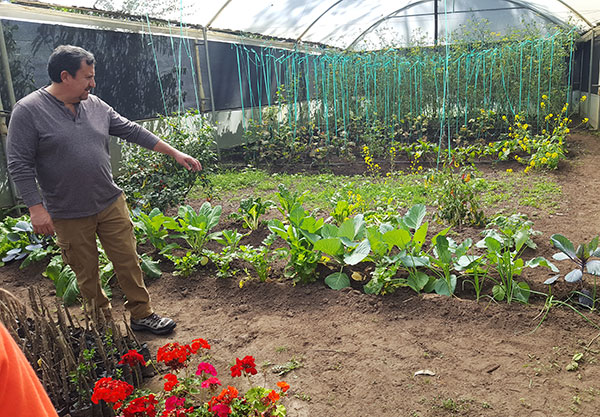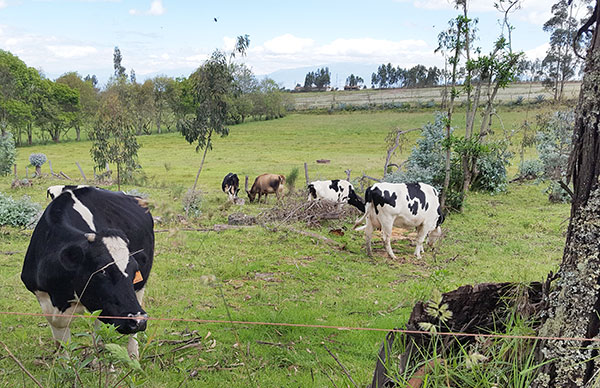By Jeff Boshart
The main purpose of the Global Food Initiative (GFI) trip to Ecuador on June 16-24 was to spend time meeting with Alfredo Merino, executive director of La Fundacion Brethren y Unida (FBU–Brethren and United Foundation).
FBU has a proud and exemplary history of serving not only the communities near its campus and farm in Picalqui, about an hour north of Quito, but other parts of Ecuador as well. It was formed when two former mission agencies–the Church of the Brethren mission in Ecuador and the United Andean Mission–combined their social and community development ministries in the 1970s. Neither mission is in Ecuador presently.
Conversations about having the Church of the Brethren re-engage in Ecuador began in 2016 when Dale Minnich, a former mission worker and first executive director of FBU, expressed interest in an exploratory visit. Former Global Mission executive Jay Wittmeyer gave the green light for Minnich to pursue a trip and in 2017 he traveled to Ecuador with some financial support from the GFI. On his return, Minnich encouraged the GFI to begin a dialogue with FBU to see how we might be of support, leading to a seat on the FBU board of directors through 2022.

In the past decade, FBU has experienced financial difficulties. GFI grants over the past four years have helped the farm become productive and innovative. Grants have been used to work with youth and young adults in the community to provide training in organic vegetable production, cooking, and environmental stewardship. Pre-COVID, FBU was regularly hosting school groups and international volunteers to work and learn on the farm. GFI grants also allowed for the construction of two greenhouses and the purchase of two dairy cows with improved genetics. Some milk is used to make cheese and the rest is sold. Grants also aided formation of a micro-company for vegetable seedlings and produce together with young adults in Picalqui.
However, COVID-19 in 2020 and hailstorms earlier this year caused major financial setbacks, and with the slow pace of Ecuador’s vaccination campaign, 2021 looks to be equally difficult. Recently a financial arrangement was made with a local land developer to use FBU’s entrance road for access to a new housing development being built. Much of this money went toward covering back pay for employees and some will be added to a grant received from the Emergency Disaster Fund (EDF) through Brethren Disaster Ministries to repair roofs and floors damaged by flooding.
GFI has helped place a student from Wheaton (Ill.) College at FBU for a six-month stay. During this trip, I was able to meet with him and his host family. I also met with members of the youth association involved with vegetable production and toured their greenhouse to see their seedling production. Demand is high for seedlings, and they have plans to expand. During a farm walk, I learned about each element of the farm’s production system and discussed weaknesses and potential improvements, animal nutrition, and pasture management. Additional conversations with FBU staff generated ideas for partnerships with other organizations to generate more income, support the running of camps and retreats, and carry out renovations of aging infrastructure.

I also was able to visit one of FBU’s community outreach programs, a reforestation initiative on land owned by the federal government in the mountains above Tabacundo. The peaks in that area are over 4,000 meters high and we could see Cayambe–an active volcano. Starting in 2002, FBU organized youth to plant thousands of trees along a road that winds back and forth for 15 to 20 kilometers. The project lasted for over a decade and now the trees are old enough to produce seeds, which are dropping down steep hill sides and leading to natural reforestation. It’s impressive and hopeful to see what is possible when a change agent like FBU is willing to act as a catalyst to bring together community members who wish to make their community a better place.
One morning a pastoral couple from a nearby church stopped by. They were new to the area, it seemed, and had never been to the campus. They were impressed and began talking about possibilities to utilize it at some point. I encouraged staff to reach out to other church organizations as well as US Christian organizations that focus on creation care and environmental education.
Another morning, my whole family and I volunteered with vegetable planting before heading to Quito for COVID-19 tests. Upon returning in the afternoon, we did weeding in the FBU tree nursery.
My wife, Peggy, throughout the trip shared from her farming expertise. She encouraged FBU not to lose sight of its main goal of serving the poor in the community while looking at the possibilities of raising funds from the wealthy. As if God wanted to emphasize this point, an older gentleman representing a group of farmers in the community stopped by that evening to discuss how FBU might help them farm in more environmentally sustainable ways.
— Jeff Boshart is manager of the Church of the Brethren’s Global Food Initiative. Find out more about this ministry at www.brethren.org/gfi.
‑‑‑‑‑‑‑‑‑‑
Find more Church of the Brethren news:
- Annual Conference 2024 invites Church of the Brethren to gather in Grand Rapids
- Annual Conference officers return query regarding congregational latitude on matters of human sexuality
- Silent Auction to benefit translation expenses and the general Annual Conference budget
- Mission and Ministry Board completes Kingian Nonviolence training, works at envisioning
- Leadership Team issues clarification on On Earth Peace membership with Supportive Communities Network